


Clergy prepare to preach into the






Clergy prepare to preach into the


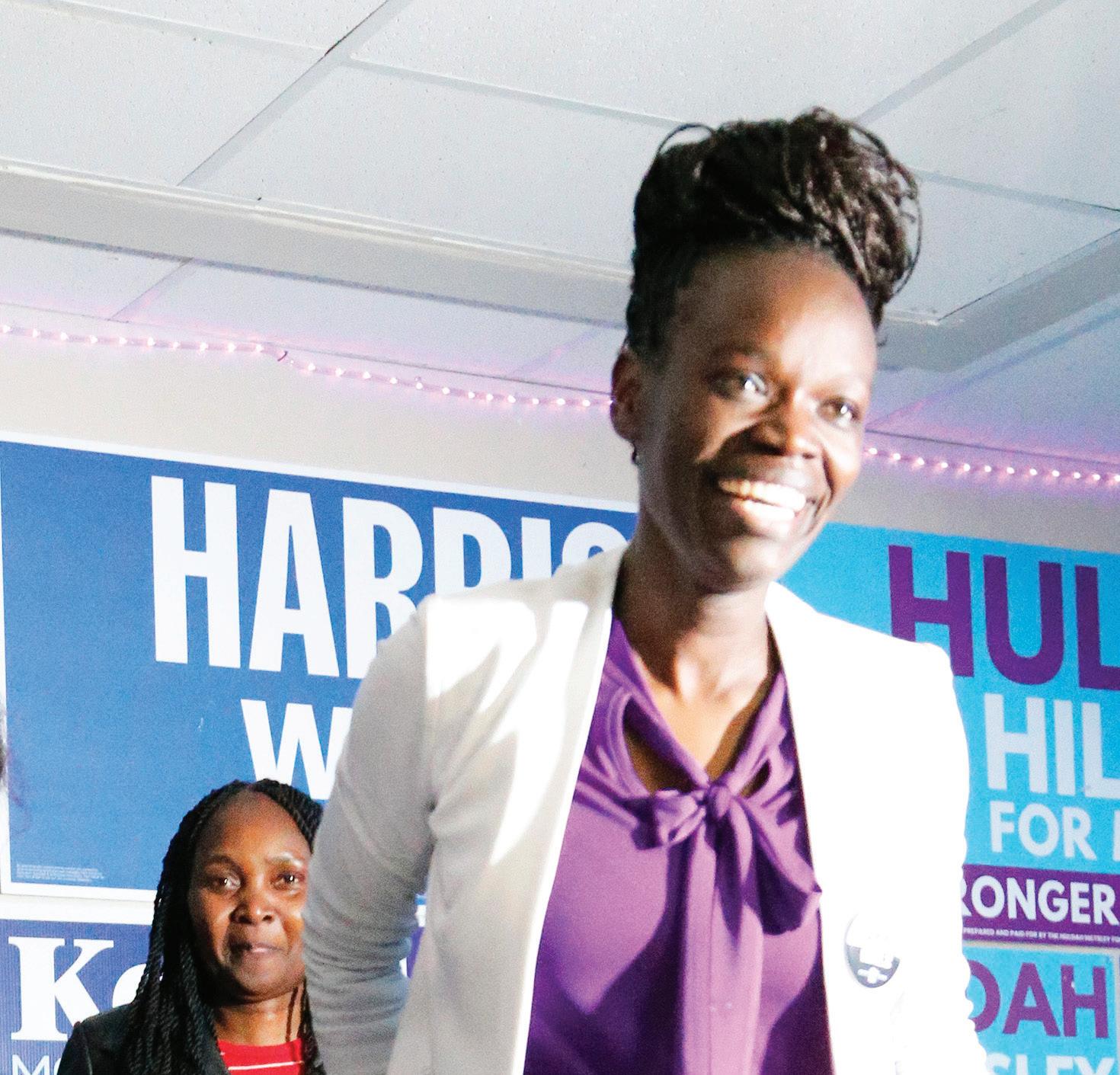
Her family was nearly deported, but in January she heads to St. Paul as one of Minnesota’s newest lawmakers
By Edwin Okong’o Mshale
If Paul Wellstone, the late U.S. senator from Minnesota, is looking down from the heavens, he is smiling and happy to see what became of the young Kenyan woman whose family he saved from deportation decades ago.
That young woman was Huldah Momanyi Hiltsley, who made history on Tuesday.
When voters chose her to represent District 38A in the Minnesota House of Representatives, Hiltsley became the first Kenyan immigrant to win a state assembly seat anywhere in the United States. Hiltsley, who ran on the ticket of Democratic Farmer-Labor (DFL), as the Democratic Party is known in Minnesota, defeated Brad Olson, her Republican opponent, by winning almost 65% of the vote.
“I stand before you tonight with a heart overflowing with gratitude,
love, and a deep sense of responsibility,” Hiltsley said in her acceptance speech, fighting back tears, amid cheers from dozens of supporters who gathered for her election watch party at Oro Lounge in Brooklyn Park. “I want to honor my parents who have been a source of courage and resilience throughout

When you reach Medicare age, it can be a little overwhelming. It’s like a whole new puzzle of health plan coverage that needs to be solved. There are many who call me and ask, “Can you just put it together for me?”
At UCare, we can certainly do that. But we also really want members to understand what they are getting and why. The plan you select all depends on your life and what kind of coverage you need and don’t need.
Apart from Original Medicare, there are two plan types that people who are aging into Medicare gravitate toward: Medicare Advantage plans and Medicare Supplement plans. Let’s dive in.
Think of a Medicare Advantage plan like a bundle of benefits. It combines your Original Medicare, Part A (hospital insurance) with Part B (medical insurance). UCare Medicare Advantage plans
give you extra coverage and benefits like dental, prescription eyewear and hearing aids. Most plans also include prescription drug coverage (Part D), which can become increasingly important as you age.
UCare has been offering Medicare Advantage plans since 1998 — longer than any other health plan provider in Minnesota. And today, they’re some of the most popular plans. We have a range of Medicare Advantage plans to choose from that include coverage while you travel and allowances for over-the-counter purchases.
One more thing: UCare Medicare Advantage plans work fantastically for local Minnesotans, due to their large network that includes 97% of Minnesota medical clinics and hospitals.* So if you have a clinic you’ve always used, your chances are good that it’s in-network. And with no referral needed to see a specialist, getting the care you need is easy.
A Medicare Supplement plan is something you pair with your Original Medicare. In other words, it supplements your plan. Get it? These policies help pay for the out-of-pocket costs that are not covered by Original Medicare (Part A and Part B).
The main benefits of a UCare Medicare Supplement plan is protection and predictability. You will have low or no copays or coinsurance when you get care, so your costs are predictable. Your monthly premiums are your main costs — no more unexpected medical bills. Speaking of, UCare’s Medicare Supplement plans offer some of the lowest Medicare Supplement premiums in Minnesota.
Another great benefit of a Medicare Supplement plan is the nationwide coverage. You can see any doctor who accepts Medicare patients, anywhere you go in all 50 states. This is especially useful whether you’re traveling, moving or living in a place where there are fewer providers nearby.
You also get extras like no-cost fitness memberships and discounts on hearing aids.
I’ve just gone over a couple categories of plans, but please know that we have a variety of plans for everyone, all across Minnesota! Each of them is designed to meet your health and lifestyle needs. The best way to know which one is right for you is to sit down with a broker, or someone like myself,
to help find the plan that’s right for you.
Finally, I’ve been riding with UCare for nearly 10 years now, and I can honestly tell you — it’s the people who make our company go. That’s why we often say we’re “people powered” — never stopping until we know that you understand your plan and you’re comfortable with it. And if there’s ever a problem, we don’t send you up a phone tree. We work the problem individually until it’s solved. It might be why nearly 95% of UCare Medicare Advantage members choose to stay with UCare year after year.**
If you have any questions about anything I’ve covered, you should reach out to your local broker. They can help you decide which plan makes the most sense. Visit ucare.org/ma to find a broker near you.
You can also give UCare a call at 1-866-460-5093 or stop by the headquarters in NE Minneapolis or our Duluth office.
UCare headquarters 500 Stinson Blvd NE Minneapolis, MN 55414 Monday – Friday, 9 am – 4 pm
UCare Duluth office 325 West Central Entrance Suite 200 Duluth, MN 55811 Monday – Friday, 9 am – 4 pm
*Based on 2023 CMS data
**Based on internal UCare enrollment data from 2022 compared to 2021
Political yard signs can symbolize intentions and allegiance. But this year, they’ve also symbolized betrayal. During this general election, Black women were led to believe that more White women would stand with us. Exit polls, however, told a different story. Despite overwhelming displays of support, more White women still chose to vote for the convicted felon, reality TV star, and rapist. White women answered the call but left us hanging at the polls.
A familiar disappointment
I live in DeKalb County, Georgia, and the abundance of Harris-Walz yard signs could’ve fooled me. But I’ve seen this before, back when Stacey Abrams ran for governor. White women showed up, put up signs, attended rallies, knocked on doors, and phone-banked. Yet, when it came time to vote, they let us down—not once but twice. I’ve been here for over 15 years, and if there’s one thing I know, it’s that political signs are symbols without weight.
In every election, I’ve talked with White women. Most aren’t the primary earners in their families and vote along party lines, aligning with the preferences of their fathers and husbands. These conversations reveal a reluctance to break from tradition, even when their votes affect women and certainly when their votes impact the lives of people who look like me.
The illusion of solidarity—symbols are not enough
On social media, I’m seeing White women posting pictures of blue bracelets to “prove” they didn’t vote for Trump. “The blue bracelets are something White women are wearing so others can see that they didn’t vote for Trump,” says Liberal Lisa from Oklahoma on X. Chile, bye. These bracelets are hollow symbols, empty gestures that mean nothing to me. An accessory to claim distance from Trump’s legacy is superficial comfort, while the choice to not stand with us in the voting booth is far more profound.
I’ve seen Black Lives Matter signs and black squares posted on Instagram to “prove” support for Black people, but we now know that was a lie, too. Will those same people who claimed Black lives mattered now take down their Harris-Walz signs and show their true selves?
Navigating these truths is a daily struggle for me—professionally and socially. White women often misuse their privilege, supporting us only when it’s convenient. Seeing overqualified Black women sabotaged or abandoned by White women at critical moments is a constant emotional challenge. It’s exhausting to live with this reality, especially when solidarity seems like something they pick up and discard at will.
One clever campaign ad from Harris-Walz that spoke directly to White women. “Your Vote, Your Choice” emphasized that their vote was private— independent of their household situation. Another was from Olivia Howell Dreizen, the “Vote Without Fear” campaign, which empowered women to consider the greater impact of their choices. But it seems many still couldn’t choose the roadmap to freedom—even when it was handed to them.
A call for action beyond words
White women, I want to believe you care, but actions speak louder than yard signs, bracelets, or Instagram posts. Show up in our communities, advocate in your workplaces, and stand up to dismantle the structures that uphold white supremacy. Only through real action will we know where you stand. If you choose not to act, we see you—and we know exactly where you stand. Good luck these next four years.
Dawn Montgomery is a national correspondent for the National Newspaper Publishers Association (NNPA), the trade association for America’s Black owned newspapers. She wrote this for the NNPA where it first appeared on the NNPA’s BlackPressUSA.com. views and opinions expressed do not necessarily reflect the official policy or position of BlackPressUSA.com or the National Newspaper Publishers Association or Mshale.
City Council
Cont’d from Pg. 8
Both Goba and Page were backed by former Brooklyn Park City Council member Wynfred Russell while McGarvey, Wako and Xiong enjoyed the support of the local DFL.
With all the three Black men on the ballot Tuesday going down in defeat, the seven-person council will now go back to having just one Black person on it. Since Wynfred Russell was sworn into office as the first Black person to serve on the council on January 2019, successive elections saw the presence of at least two Black members on the council when Boyd Morson won the Central District seat in 2020 and people of color have since enjoyed a slight majority reflective of the city’s demographics. After new members take their oath of office in January, the council will have four white members while Xiong, Maria Tran and Mayor Winston will be the only council members of color.
McGarvey, Wako and Xiong spoke at the Huldah Hiltsley election watch party Tuesday evening where they all thanked supporters.
“Brooklyn Park, I want to thank you for giving me the opportunity to hear what your needs are and take that to the council as we try and plot a path forward that brings us all together, because as our new House Representative motto says ‘we are stronger together’,” McGarvey said.
Xiong who enjoyed strong backing from Mayor Hollies Winston thanked him for “picking up my random phone calls in the middle of the day asking you random questions.” She said she considered District 38A state Rep.Elect Huldah Hiltsley, a role model and that as a woman of color you (Huldah) “have given me so much power mentally to make it through.”
“I hope to make the city proud and that you are proud of me, just know that I would do my best and hardest to represent you, keep pushing me as I am willing and open to learning – I am a strong listener too, so please come and talk to me,” Xiong said to cheers from the crowd.
The president of Mwanyagetinge Association of Kenyans in Minnesota Ms. Roselidah Nyaberi and another supporter carried Xiong off the stage after her victory speech in celebration.

By UN News
Despite progress over the past 10 years to promote and protect the human rights of Black people worldwide, racism and discrimination persist, the President of the UN General Assembly President said on Friday.
Philémon Yang was speaking at a high-level meeting at UN Headquarters to mark the closure of the International Decade for People of African Descent - a global opportunity to both honour the often-overlooked contributions this population has made to human civilization and highlight racial injustice endured across centuries.
In proclaiming the International Decade, the General Assembly adopted a programme of activities and proposed concrete measures aimed at fostering greater
Additionally, several countries have, for the first time, taken legislative and policy actions as well as other measures to specifically address issues faced by the disaspora.
Mr. Yang warned, however, that “we must not rest on our laurels” as much work remains to be done.
“Ten years into this Decade, people of African descent still endure systemic racism and discrimination – realities rooted in the enduring legacies of enslavement and colonialism,” he said.
“We must confront and dismantle these legacies to ensure that people of African descent enjoy their full civil, political, economic, social, and cultural rights.”
He said efforts towards recognition, justice and development must continue, and strongly sup-

inclusion while combating racism, racial discrimination, xenophobia and related intolerance.
Progress has included establishing a Permanent Forum on People of African Descent, which reports to the UN Human Rights Council, and most recently, the declaration of 25 July as the International Day of Women and Girls of African Descent.
ported consideration of a Second International Decade to sustain these goals.
A top UN human rights official, Ilze Brands Kehris, echoed the suggestion. Speaking on behalf of the Secretary-General, she said the meeting was “a call to faster action, greater collaboration, and deeper determination” towards a world free from racism.
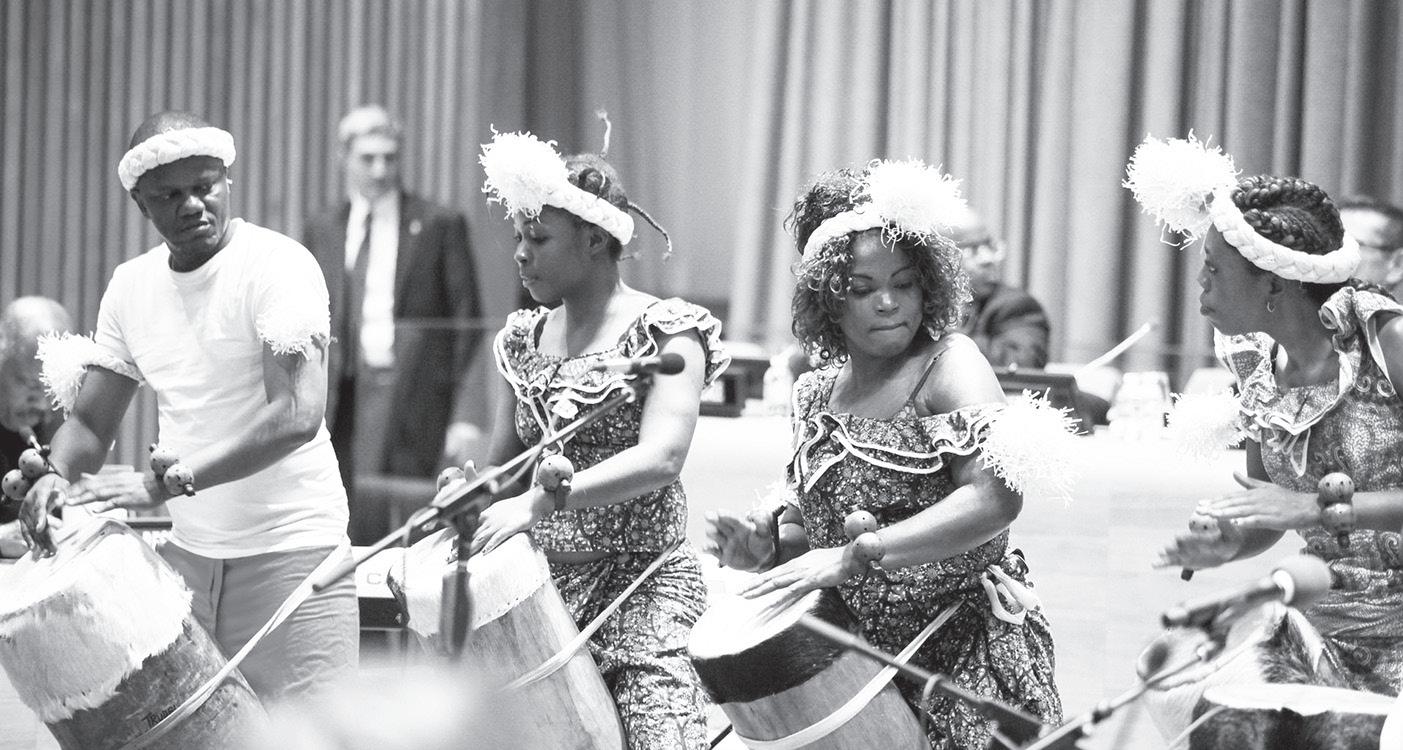
The “starting point” requires learning the lessons and building on the successes of the International Decade that is coming to a close.
“We need to maintain the momentum gained over the past 10 years – the multiple new laws and policies, greater recognition of people of African descent and their invaluable contribution to our societies,” said Ms. Kehris, who is Assistant Secretary-General for Human Rights.
“The proclamation of a Second International Decade is key to that goal. It must be inclusive, focused, and underpinned by strong leadership and political will.”
American civil rights activist and law professor Kimberlé Crenshaw coined the term “intersectionality” more than 30 years ago to describe how various forms of inequality – for example, related to race, gender, ethnicity and class - interact and exacerbate each other.
The co-founder and Executive Director of the African American Policy Forum, a non-governmental organization (NGO), reflected on the challenges of intersectionality in advancing the full and equal participation of people of African descent in all aspects of society.
“Conditions of African-descended
people around the globe reflect the intersections of anti-Blackness with a wide variety of social, economic and historical factors, such as high rates of maternal deaths and maternal health disparities across income levels and national and regional borders,” she said.
“The gender dimensions of intersectionality are also reflected in the vulnerability of African-descendant men to State violence and incarceration - a vulnerability shared in some context by women as well,” she said, noting that access to education, political power and cultural recognition “are all legible through an intersectional lens”.
Ms. Crenshaw urged the international community to resist calls to abandon efforts toward greater inclusion.
She cited the late Nelson Mandela who once told the General Assembly that the universal struggle against apartheid in South Africa was not an act of charity but an affirmation of our common humanity.
“As such, let the Second Decade for People of African Descent be a reminder of our common humanity and that we are not fully free until all people are free,” she said.

By Tom Gitaa Mshale
Democratic U.S. Rep. Ilhan Omar has secured a fourth term, defeating Republican challenger
Dalia Al-Aqidi in Minnesota’s 5th Congressional District by more than 50 percentage points as of midnight Tuesday when 90% of the precincts had reported. She had garnered 245,363 votes to Al-Aqidi’s 75,996.
The resounding victory marks a significant milestone for the Somali American congresswoman and the only African-born member of Congress, cementing her place as a prominent voice in both local and national politics.
Omar, the first Somali American and first African refugee elected to Congress, has consistently faced stiff political opposition since filling the open Fifth Congressional District seat formerly held by current Minnesota Attorney General Keith Ellison in 2018. In this election cycle, rivals sought to capitalize on Omar’s stances on the Israel-Hamas war. But Omar’s focus on Democratic
priorities – including reproductive rights, economic justice, and addressing childhood poverty – resonated with voters in the diverse Fifth District, which includes Minneapolis and nearby suburbs. The congresswoman made protecting and expanding reproductive rights a central issue in her campaign, echoing a nationwide debate on the topic. Omar also pledged to combat “corporate greed,” cut taxes for the middle class, and ensure a child tax credit to address poverty.
This election saw a notable shift in strategy from groups that have historically sought to unseat Omar. The American Israel Public Affairs Committee (AIPAC), — which spent heavily to unseat fellow progressive members of the “Squad” — did not invest in the Fifth District race, an acknowledgement of the strong support she enjoys from 5th District voters evidenced by resounding victories both in the election and recent Democratic primary race. Speaking at the DFL watch party at the InterContinental Hotel in St. Paul, Omar addressed jubilant

supporters and thanked them for trusting her leadership but that a tough road lies ahead “Because no matter who the next president is, it’s going to be up to us to push for the progress we want to see, strengthening workers’
rights, restoring abortion rights, passing urgent climate action, bringing an end to the genocide in Gaza, and much much more.”
Mshale Photojournalist Jasmine Webber contributed to this story.


my life. Our immigration story – our journey to this country – shaped my identity and purpose.”
The Hiltsley’s journey to the state capitol is one of the most remarkable stories of an immigrant’s resilience – one that restores faith in the American dream. It was a long, difficult, and at times painful journey that could have ended before it began, if it weren’t for the last-minute intervention by her community, and a U.S. senator who listened and decided to act.
“Senator Paul Wellstone stood up for us, and his belief in fairness and justice left a lasting impression,” said Hiltsley.
In 2021, this reporter sat down with Hiltsley at her home in Brooklyn Center as she told her family’s immigration story. Her father, Phillip Momanyi, came to the United States as a student in 1988. His wife Tabitha joined him in 1992, followed in 1995 by 9-year-old Hiltsley and two siblings. The youngest of her siblings was born in the United States.
For 11 years, Momanyi fought the immigration system to gain legal permanent residency for himself and his family. His efforts were unsuccessful, and the family was ordered to leave the country. With only 48 hours left, a coalition led by an African American church the family attended petitioned Wellstone to intervene. The senator began lobbying for the

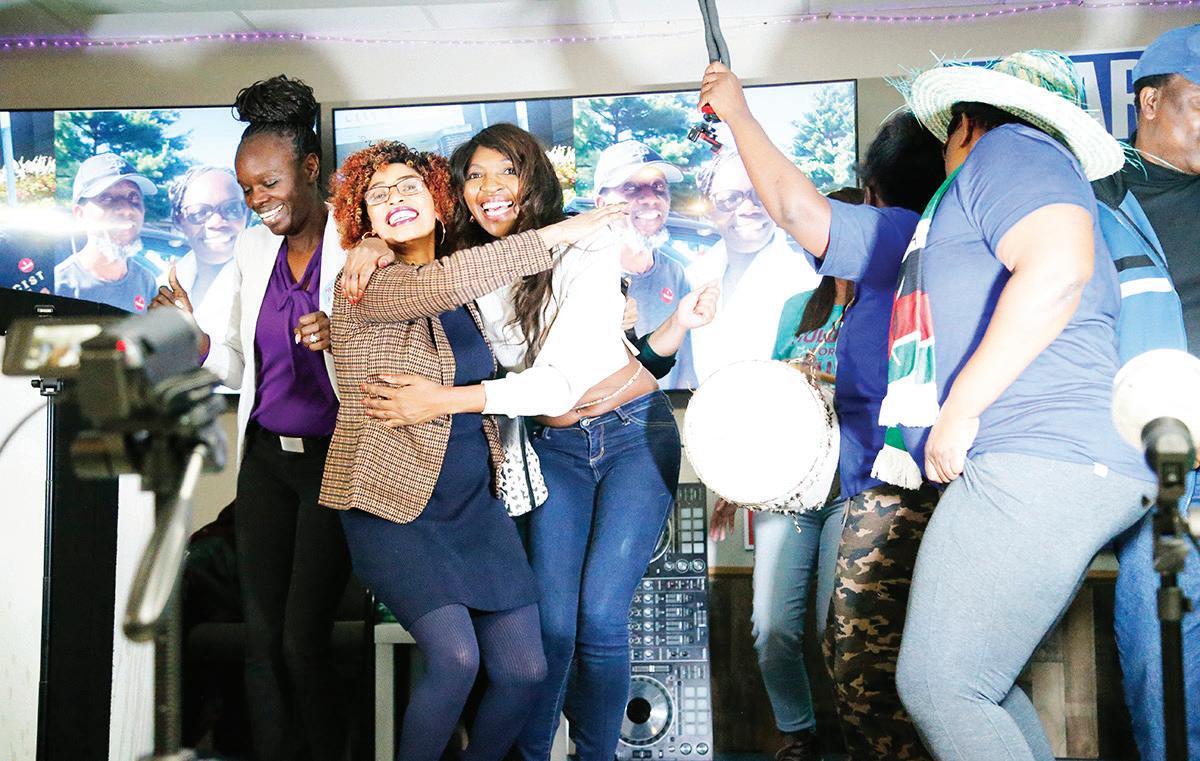
suit with “HULDAH FOR HOUSE” and “HARRIS-WALZ” pins on the left collar of his jacket. When it was clear that their daughter had won, Momanyi became emotional about what could have happened if his family had been deported. Wellstone would have been exceptionally happy to see Hiltsley make history, he said.
“Senator Wellstone was a very compas-
about the American dream, that’s where it was born for me as an individual. That’s when I realized that I could do anything.”
As she grew older, Hiltsley developed a strong desire to serve the community that rallied so hard to help when her family had lost hope. She attended Cooper High School in a Minneapolis suburb coincidentally named New Hope, before
living company named Fortunate Homes LLC, said Hiltsley made an immediate impact when she took office at Mwanyagetinge.
“She’s a visionary thinker,” Obwaya said. “She sees the future.”
Obwaya said Hiltsley did a lot for the community, like applying for grants and trying to bring awareness to people

family, which led to a last-minute court ruling overturning the deportation order. Unfortunately, Wellstone and his wife, Sheila, died in a plane crash in October 2002. He was 58.
“His intervention kept us here, and that experience taught me that government can truly be a force for good,” Hiltsley said. “We were not Americans who could give him votes, but he helped us just because we are human beings.”
At the watch party, Hiltsley’s mother, dressed in a sparkling purple skirt and a matching coat, danced to African music with other women. Hiltsley’s father paced around clad in a checkered blue
sionate man,” Momanyi said. “What he and his wife Sheila did for us is the reason we are still here, and we are very grateful.”
Hiltsley said because she was very young back then, she didn’t understand the magnitude of what the community and Wellstone had done for her family until years later when they became U.S. citizens.
“I didn’t have to think about, ‘Oh my goodness. I can’t say something because I’m worried about who is around me. I can’t go somewhere because I’m worried about, my immigration status. I can’t apply for a job. I can’t do this. I can’t do that,’” she said. “When you talk
heading to Bethel University, where she earned three bachelor’s degrees, and later an MBA. Although she went on to build a successful career as data privacy and protection professional, Hiltsley said her true passion was organizing her community to ensure that the needs of every resident were met.
One of Hiltsley’s first major leadership roles was serving as the president of Mwanyagetinge, the largest organization of Kenyans in Minnesota. The population of Kenyans in the state is estimated to be around 20,500, according to the research nonprofit, Minnesota Compass.
Suzie Obwaya, a Kenyan American and businesswoman who runs an assisted
about what resources were out there for them to tap into. Obwaya said Hiltsley won the election because over the years she had built a reputation of a genuinely friendly and honest person.
“One thing I like about Huldah, first of all, is her smile,” Obwaya said. “When she smiles at you, you feel the warmth.”
Hiltsley first entered politics when she ran for a state Senate a seat in District 40 in the 2022 elections. However, following the redistricting mandated according to the 2020 U.S. Census results, she found herself in District 38
with Susan Pha, a councilwoman in the city of Brooklyn Park.
When she announced in 2023 that she was going to run for the House seat, Hiltsley found herself yet again going against Wynfred Russell, another savvy, trailblazing candidate, who like Pha had extensive experience running a successful election campaign. In 2018, Russell became the first Liberian American, and the first Black person elected to the Brooklyn Park City Council. Instead of seeking re-election in 2022, he opted to

run for mayor of the city but lost.
In April, Hiltsley and Russell went to the DFL convention hoping to win the 60% of delegate votes needed for the party to endorse a candidate. When neither met the threshold, they took the decision to DFL voters in the primaries held on Aug. 13. Hiltsley beat Russell by a mere 50 votes to clinch the nomination.
Speaking to Mshale on Tuesday, Russell attributed Hiltsley’s victory in the primaries to the experience she gained when she ran against Pha.
“It was a very close race, but in the end the person who worked the hardest won,” Russell said. “I have participated in a number of elections, but running for the House is a whole other animal. There is a lot of helpful strategies that I think she put into the primary race, which showed that she learned a lot.”
Ben Hackett is the local DFL branch chair in Brooklyn Park and an early supporter Hiltsley, who endorsed soon after party delegates failed to agree on a candidate to back. Hackett said he got to know Hiltsley well during her run against Pha, who he said was his friend. He decided to back Hiltsley as soon as he heard that she was running for the House seat. What impressed him most about her was that, even after she lost, she never stopped participating in community events.
“I just saw her everywhere,” Hackett said. “She was helping out, but she wasn’t really asking for something in return when she volunteered with the


Hackett said Hiltsley continued to participate in local DFL meetings and community events. After getting to know her, Hackett said he concluded that Hiltsley wasn’t out there for her own personal gain but seemed driven by a strong desire to making sure that her neighbors, friends, and community were properly represented and engaged in the political process.
“That’s the principal reason why I strongly supported Huldah,” he said. “And while I would like to call myself a friend of her opponent [Russell], I just felt that she was a better fit for the district and that’s why I endorsed her.”
Hackett said he believed that, after Hiltsley assumed her duties at the state capitol, she would continue doing the same community building and networking that won her so many supporters and helped her win the elections.



By Tom Gitaa Mshale
The Brooklyn Park City Council will have a female majority when two new members take the oath of office in January. Amanda Cheng Xiong defeated the twice censured Boyd Morson in a landslide to become the next councilmember for the East District. Incumbent XP Lee was not seeking reelection.
Xiong’s 7,279 votes represented more than 60% of those who voted, with Morson who currently represents the Central District and had been redistricted to the East, receiving 4,737 (39.20%).
In the West District, another incumbent, Tony McGarvey, faced a rematch with Liberian-born Daniel Goba. McGarvey received 4,390 (56.76%) of the votes cast to Goba’s 3,280 (42.4%).
The two first squared off in a low turnout special election on August 8, 2023 to fill the seat then occupied by Susan Pha who was elected to the Minnesota Senate. McGarvey won that special election by receiving just 351 votes to Goba’s 78 votes to finish the
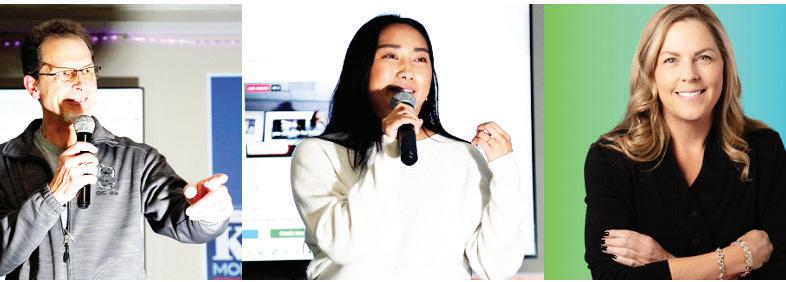
remainder of Pha’s term.
This will be McGarvey’s first full term.
The closest election was in the Central District where political newcomer, Shelle Page, defeated longtime city budget advisory committee commissioner Teshite Wako by just 341 votes. She garnered 5,739 to Wako’s 5,398.
This was Ethiopian-born Wako’s second attempt to join the city council. Despite
the loss, he vowed to continue serving the community to make the city a better place.
‘For everything there is a time, there is a season for everything, we are not going anywhere, let Brooklyn Park know that this is not the end and thank you to everyone that voted for me and had my yard sign outside,” Wako said when he addressed supporters at State Rep.Elect Huldah Momanyi Hiltsley election night watch party at Oro Lounge.
Page on her part took to social media to thank supporters.
“I am deeply humbled and grateful to have earned your trust to serve as your Central District Council Member. My heartfelt thanks to our dedicated volunteers, my supportive family, and every resident who participated in the democratic process,” Page said in a Facebook post after winning the Central District. She added in the same post that she looks ford to working collaboratively with others to build a strong city.
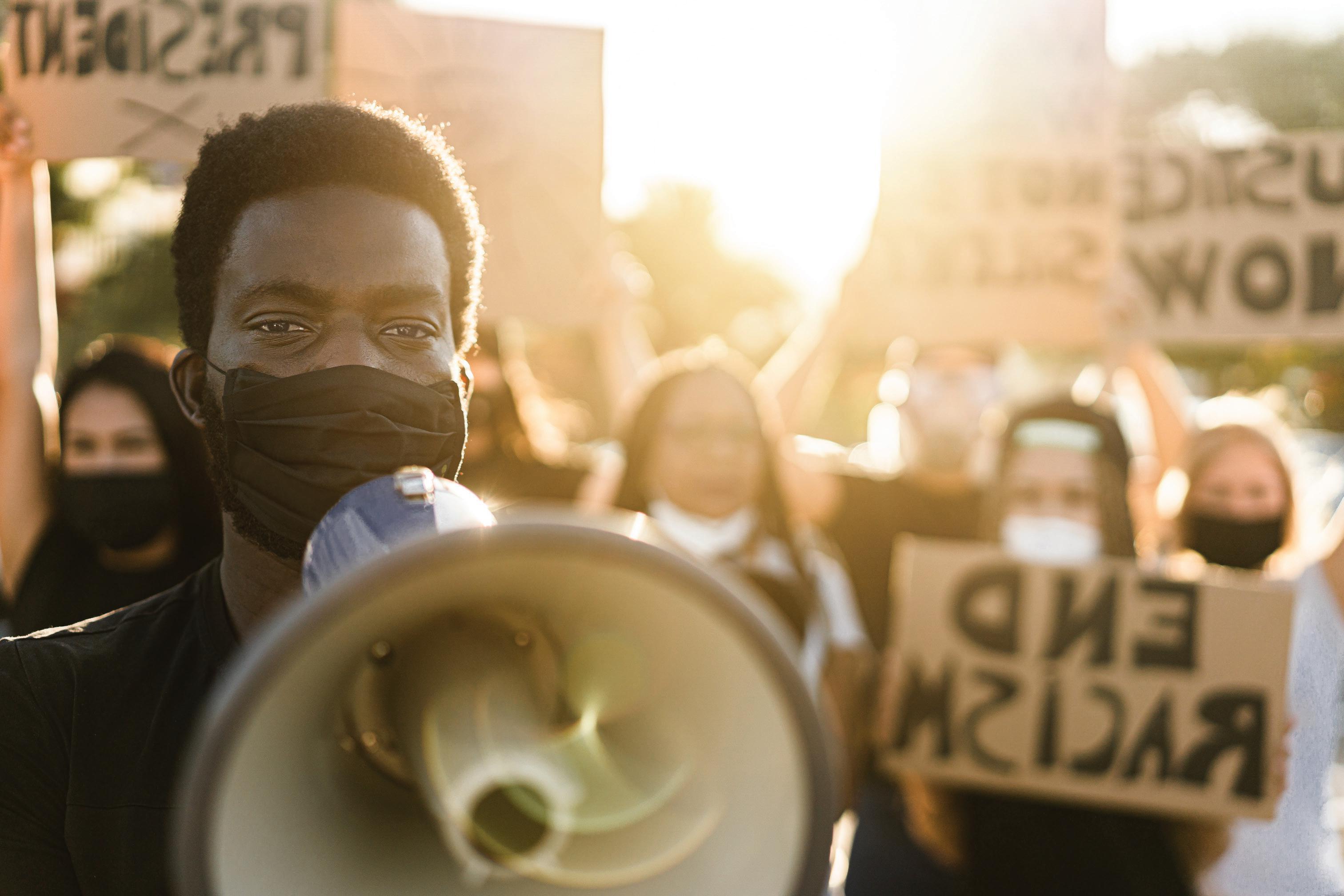
By Adelle M. Banks Religion News Service
(RNS) — As they mount their pulpits this weekend (Nov. 8-10), clergy of several faiths said that they expect emotions to be swirling still from President-elect Donald Trump’s victory over Vice President Kamala Harris. Often facing a constellation of feelings in the pews, many are working on strategies if not for healing, then at least not ignoring the subject.
“The big ‘do’ is talk about it: Find some way to talk about it,” said the Rev. Leah Schade, president of the Academy of Homiletics, a 200-member organization of teachers and graduate students of preaching. “The big ‘don’t’ is don’t just pretend like it didn’t happen.”
Schade, who also teaches at Lexington Theological Seminary in Kentucky, said she has been recommending the same do’s and don’ts for sermons during “very fraught, very fractious” election seasons since 2016.
Preachers are turning to webinars, directories of appropriate liturgies and moral support from each other as they determine how to address their congregants. Schade said focusing on the message that “all people are created in God’s image,” no matter who they vote for, will do, as will recalling the need to keep everyone safe or being careful with our words. But it is important for clergy to speak up.
“If we don’t say anything, that unintentionally sends a message that the Bible and our faith has nothing to say about these issues that are going to impact the children, teens, families, seniors, adults and our congregation for generations to come, said Schade, author of the forthcoming “Preaching and Social Issues: Tools and Tactics for Empowering Your Prophetic Voice.”
Some clergy will be speaking after taking strong stands themselves ahead of the voting day. In the weeks leading up to the election, the Rev. Otis Moss III, pastor of Chicago’s Trinity United Church of Christ, led after-worship “Democracy is on the Ballot” sessions in which he critiqued Project 2025, a series of conservative proposals issued by the Heritage Foundation, a Washington think tank, that some say is a policy blueprint for a second Trump administration.
Now, said Moss, members of his predominantly Black congregation are mostly saddened by the outcome at the top of the ballot. “I’m going to be sharing with people the necessity to hold your grief, to be able to grieve prophetically but not pathetically,” he said, drawing on the New Testament’s Letter to the Hebrews, which says “let us run with perseverance the race marked out for us.”
Imam Tariq I. El-Amin, who leads the majority African American Masjid Al-Taqwa — a mosque four miles due east of Moss’ church — likewise planned a message encouraging engagement rather than inaction. He planned to cite a verse from the fourth chapter of the Quran to bring home a point about the common identity “we share as a human family.”
Though personally glad to see two Black women elected to the Senate and
each other while we cope with how our reality is being experienced,” she said. “We need to rediscover the fact that we actually really do need each other.”
Dean Inserra, lead pastor of City Church in Tallahassee, Florida, didn’t even wait to know who had won. “I wrote my message on Tuesday afternoon, because I believe the message does not change depending on who’s in office,” said Inserra, a member of the Southern Baptist Convention Executive Committee. “I wanted our church to see that and see that I really do believe that, so I posted a picture on Instagram of my sermon being done on Tuesday at, like, 2 o’clock.”
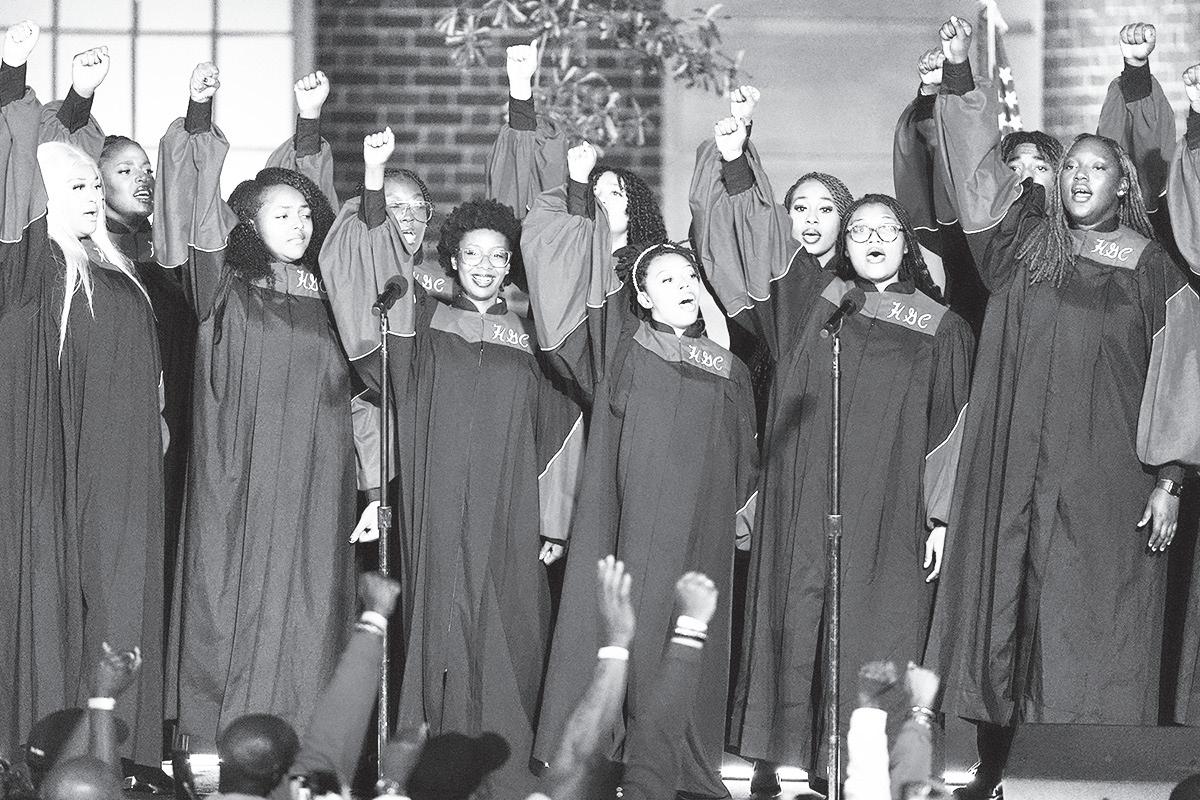
the re-election of two Muslim women to the House, El-Amin said his Friday sermon might not touch on particular candidates and likely won’t mention Trump’s past imposition of a ban on travel for citizens of some Muslim-majority countries.
“I don’t think it’s actually necessary for me at this point to talk about the whatifs of what he might do as opposed to it being more important to talk about what does our engagement look like for the next four years,” said El-Amin. “This is actually not a time for us to go into our silos, but the work that we want to talk about doing is work that we should be doing broadly, reaching out and connecting with other communities.”
Rabbi Ariel Stone, who leads a diverse congregation that includes Israeli citizens in Portland, Oregon, said she will preach on the story of Abraham — “the first person to self-identify as what we now call the Jewish people” — and link it to the need to focus on community, rather than one individual, even the U.S. president.
“What we are holding onto is not that we agree on everything politically, but that we believe in the strength of our community to carry us through and to hold onto
“Prophetic grief holds pain but refuses to fall into despair or cynicism,” said Moss. “Pathetic grief falls into despair, cynicism and pessimism and lives a narrative of ‘I can do nothing.’”
He was finishing up a series on the biblical book of Jeremiah with a message about “what it looks like to live faithfully among a people who don’t share their beliefs,” as his conservative church sits in Florida’s “very, very blue” capital city. Inserra, who described himself as having “great concerns about the progressive politics of the left,” said he never endorsed Trump from the pulpit but did speak on earlier weekends about voting “no” on Amendment 4, an abortion rights measure that was narrowly rejected on Tuesday.
He tweeted his gratitude for that result but had no plans to revise his sermon because of it: “We talked about it enough, and I don’t want to gloat.”
Some faith-based organizations helped clergy prepare for what they might say in study groups, supportive spaces and webinars such as the Central Conference of American Rabbis’ online session titled, “After the Elections: What Is My Message This Shabbat?”
“Some rabbis are certainly pleased by the results of the election, but many are distressed,” said Rabbi Hara Person, chief
executive of the group, which comprises Reform rabbis, in a statement to RNS. “Still, whatever their vote expressed, rabbis are able to hold multiple and even conflicting and challenging truths, perspectives, and create space for respectful, inclusive dialogues.”
Bishop Bonnie A. Perry of the Episcopal Diocese of Michigan has been sending a weekly “Responding Faithfully to this Election” newsletter to clergy and lay leaders and helped organize a theme of “Going Forward Together” for Nov. 10 services in her diocese. A guide for liturgies that day contains options for Scripture readings and prayers.
“It’s hard to figure out what you should say, what you shouldn’t say, and how you thread that needle,” she said in an interview, but she recommended that clergy emphasize that people should be treated equally regardless of their religious or political views.
“I want people to be super-gracious about this,” added Perry, whose diocese, headquartered in Detroit, includes 14,000 people in 75 congregations in southeastern Michigan. “I want us to be really clear that we are a place of hope and welcome and inclusion.”
Not every preacher is choosing to proceed with just a traditional sermon on the Sunday after Election Day.
“The focus of our service is doing worship and meeting in the sanctuary and then leaving the sanctuary to serve,” said the Rev. Liz Mosbo VerHage, pastor of LaSalle Street Church in Chicago. “So this week, we had already planned, ahead of time, to do a neighborhood breakfast with our vulnerable neighbors nearby, and we’re having a speaker come in and teach about food insecurity.”
Schade cautioned against clergy preaching “a message that says we just need to ‘come together,’ especially when there are those who are being targeted because of transphobia, misogyny, antisemitism, Islamophobia, fear of immigrants, violence, racism.”
There could be activities beyond the sermon, she suggested, including oneon-one conversations with clergy and congregants and other individual private actions.
“If you say, ‘I’m available for a private conversation at your home, in my office, in a coffee shop,’ whatever, I think that is an OK thing to do,” she said. “One thing that pastors can do this Sunday, or in coming Sundays, is set up a table with candles and allow people to light a candle during the service to represent whatever their prayer to God is.”
Bob Smietana contributed to this report.
By Mshale Staff
The 67th Grammy Awards nominations were announced Friday, November 8 and Nigerian star Tems and Nigerian American Shaboozey lead the African nominees in nominations across multiple categories - and the only ones to score nominations beyond the global categories.
Tems’ song “Burning” is among the five songs nominated in the Best R & B Song category. Her debut album “Born in the Wild” received a nomination for Best Global Music Album where she is competing against fellow Nigerian Rema, who got nominated for his “Heis” album.
Nigerian American Shaboozey, whose real name is Collins Obinna Chibueze, has a record five nominations: Best New Artist, Song of the Year and Best Country Solo Performance for his “Bar Song (Tipsy).” The remix of “Bar Song (Tipsy)” he did with David Guetta earned them a nomination in the Best Remixed

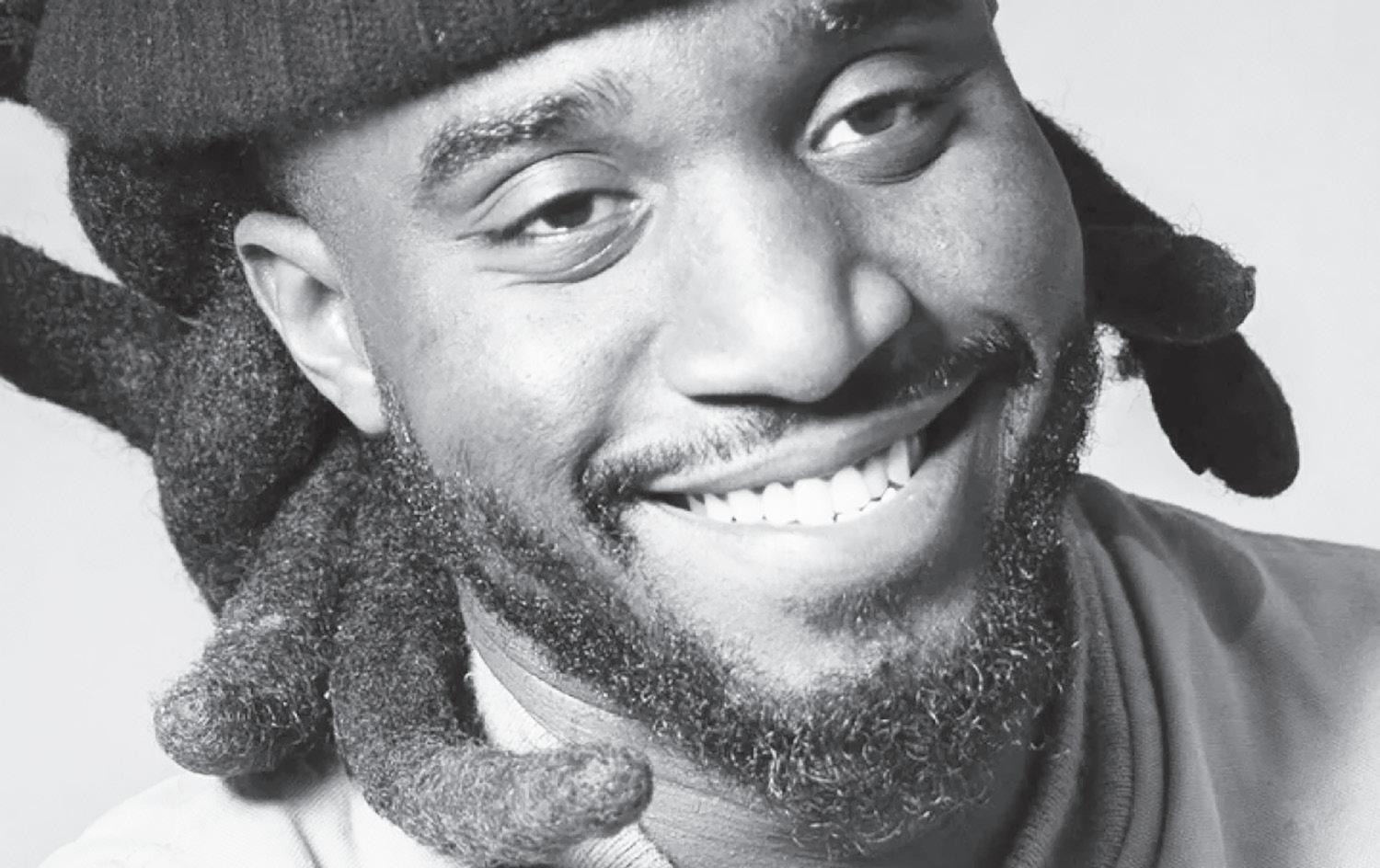
born to Nigerian parents, Jordan Adetunji, was nominated for Best Melodic Rap Performance for “Kehlani.”
The winners will be announced during Grammys ceremony on Sunday, Feb. 2, 2025 at Crypto.com Arena in Los Angeles and will be broadcast live on the CBS Television Network.
No host has been announced as of Mshale’s press time. Trevor Noah hosted last year.
Best African Music Performance
“Tomorrow” – Yemi Alade
“MMS” – Asake & Wizkid
Recording. Shaboozey is featured along with Linda Martell in Beyonce’s “Spaghettii” which has been nominated for Best Melodic Rap Performance.
The Best Music African Performance category which was introduced last year will be back for a second year and all but one of the nominees are Nigerian. Chris Brown is one of the nominees for his collaboration with Davido and Lojay for “Sensational.” Other nominees in the category are Asake & Wizkid for “MMS,” Burna Boy for “Higher,” Tems for “Love Me JeJe” and Yemi Alade for “Tomorrow.”
Angélique Kidjo’s collaboration with Soweto Gospel Choir is nominated in the Best Global Music Performance for “Sunlight to My Soul.” Also nominated in this category is Ghanian Rocky Dawuni for “Rise.”
The Northern Irish rapper and singer
“Sensational” – Chris Brown Featuring Davido & Lojay
“Higher” – Burna Boy
“Love Me JeJe” – Tems
Best R&B Song
“After Hours” – Diovanna Frazier, Alex Goldblatt, Kehlani Parrish, Khris RiddickTynes & Daniel Upchurch, songwriters (Kehlani)
“Burning” – Ronald Banful & Temilade Openiyi, songwriters (Tems)
“Here We Go (Uh Oh)” – Sara Diamond, Sydney Floyd, Marisela Jackson, Courtney Jones, Carl McCormick & Kelvin Wooten, songwriters (Coco Jones)
“Ruined Me” – Jeff Gitelman, Priscilla Renea & Kevin Theodore, songwriters (Muni Long)
“Saturn” – Rob Bisel, Carter Lang, Solána Rowe, Jared Solomon & Scott Zhang, songwriters (SZA)
Full list of nominees at Mshale.com










